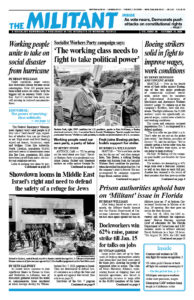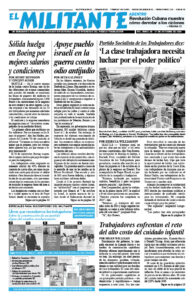After being forced to wait over a month, the Militant finally learned that the Florida Department of Corrections Literature Review Committee had once again upheld the ban on Militant issue no. 17 at Jackson Correctional Institution in Malone at its Aug. 29 meeting. But they gave no reason for their decision.
“On July 18, 2024, the LRC reviewed and affirmed the impoundment,” Melvin Herring, assistant chief of education for the Florida Department of Corrections and LRC member, wrote to Militant attorney David Goldstein in a Sept. 30 letter. “On August 29, 2024, the LRC held an independent review of the publication” and “affirmed the decision from July 18, 2024. The publication remains rejected and inadmissible with the Department’s institutions.”
There are over 100 Militant subscribers in Florida state prisons.
What were prison authorities objecting to? The Militant was informed May 17 that prison officials at Jackson Correctional Institution had banned issue no. 17 on April 29. They claimed a widely circulated Associated Press photo showing the body of a Jewish man murdered by Hamas being driven around Gaza City to cheers by Islamist thugs during the Nazi-like group’s Oct. 7, 2023, pogrom, “depict hatred toward a specific race.”
The picture was included as part of a feature article reprinting the opening chapter of Pathfinder’s latest book, The Fight Against Jew-Hatred and Pogroms in the Imperialist Epoch: Stakes for the International Working Class.
Prison authorities claimed that the photo and, by extension, the whole issue, needed to be seized because they violated three additional justifications given by the Department of Corrections for impoundments. One bars literature that is “dangerously inflammatory,” encouraging “riot, insurrection, rebellion” and “organized prison protest.”
Other justifications itemized are for material that “promotes the gang culture or lifestyle” or that “presents a threat to the security, order, or rehabilitative objectives of the correctional system.”
Violation of constitutional rights
The fight against Jew-hatred and Hamas’ murderous pogrom is a key question for workers everywhere, including behind bars. To bar access to material that discusses this violates prisoners’ constitutional rights to read political literature of their choice. It also violates freedom of the press, for the Militant and all other publications debating these crucial questions.
The importance of the issues at stake in the Militant’s fight against the impoundment is underscored by the dozens of organizations and individuals that wrote to the Literature Review Committee urging prison authorities to lift the ban. They include Amnesty International USA, Florida American Civil Liberties Union, ACLU National Prison Project, Florida Press Association, PEN America, Reporters Committee for Freedom of the Press and the Southern Center for Human Rights.
Goldstein wrote Herring Oct. 7, explaining, “The Sept. 30 Letter does not identify” which specific prison provisions “were violated by the identified photo. Nor does that Letter otherwise explain the reasons for affirming the impoundment.”
“In order for the publication to better understand the reasoning behind the censorship and affirmance, we respectfully request that the LRC identify which of the provisions” were “violated by the identified photo” and “explain why.”
The yearslong fight against prison impoundments — which the Militant has won more times than it has lost — continues.

